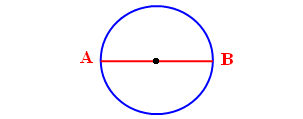SOLVING WORD PROBLEMS USING SECTION FORMULA
Subscribe to our ▶️ YouTube channel 🔴 for the latest videos, updates, and tips.
Problem 1 :
Find the coordinates of a point A, where AB is the diameter of a circle whose center is (2, -3) and B(1, 4)
Solution :

Midpoint of the diameter is center
Center = (2,-3)
Let the coordinate of point A be (a, b)
Here x1 = a, y1 = b, x2 = 1, y2 = 4
Midpoint = (x1 + x2)/2 , (y1 + y2)/2
(a + 1)/2, (b + 4)/2 = (2, -3)
Equating the coordinates of x and y
(a + 1)/2 = 2 (b + 4)/2 = -3
a + 1 = 4 b + 4 = -6
a = 4 - 1 b = -6 -4
a = 3 b = -10
Therefore the coordinate of A is (3,-10).
Problem 2 :
If A and B are (-2, -2) and (2, -4) respectively, find the coordinates of P such that AP = (3/7) AB and P lies on the line segment AB.
Solution :
AP = (3/7) AB
AP/AB = 3/7
AB is the line segment P is a point lies on the line segment.
AB = AP + PB
7 = 3 + PB
PB = 4
AP : PB = 3 : 4
x1 = -2, y1 = -2, x2 = 2, y2 = -4, m = 3 and n = 4
Coordinates of P
= [3(2) + 4(-2)]/(3 + 4) , [3(-4) + 4(-2)]/(3 + 4)
= (6 - 8)/7,(-12 - 8)/7
= -2/7, -20/7
Problem 3 :
Find the coordinates of the points which divide the line segment joining A (-2, 2) and B(2, 8) into four equal parts.
Solution :

Let "C", "D" and "E" be the points which divides the line segment into four equal parts.
length of AC = 1 unit
length of CD = 1 unit
length of DE = 1 unit
then length of EB is also = 1 unit
So, C divides the line segment in the ratio 1 : 3
x1 = -2, y1 = 2, x2 = 2, y2 = 8, m = 1 and n = 3
= [1(2) + 3(-2)]/(1 + 3) , [1(8) + 3(2)]/(1 + 3)
= (2 - 6)/4, (8 + 6)/4
= -4/4, 14/4
= (-1,7/2)
D divides the line segment in the ratio 2 : 2
x1 = -2, y1 = 2, x2 = 2, y2 = 8, m = 2 and n = 2
= [2(2) + 2(-2)]/(2 + 2) , [2(8) + 2(2)]/(2 + 2)
= (4 - 4)/4, (16 + 4)/4
= 0/4, 20/4
= (0, 5)
E divides the line segment in the ratio 3 : 1
x1 = -2, y1 = 2, x2 = 2, y2 = 8, m = 3 and n = 1
= [3(2) + 1(-2)]/(3 + 1) , [3(8) + 1(2)]/(3 + 1)
= (6 - 2)/4, (24 + 2)/4
= 4/4, 26/4
= (1, 13/2)
Problem 4 :
Find the area of a rhombus if its vertices are (3,0) (4,5) (-1,4) and (-2,-1) taken in order.[Hint : Area of rhombus = (1/2) product of its diagonals]
Solution :
Let A(3, 0) B(4, 5) C(-1, 4) and D(-2, -1) are the vertices of the rhombus.
length of diagonal AC = √(x2 - x1)2 + (y2 - y1)2
x1 = 3, y1 = 0, x2 = -1, y2 = 4
= √(-1 - 3)2 + (4 - 0)2
= √(-4)2 + 42
= √16 + 16
= √32
x1 = 4, y1 = 5, x2 = -2, y2 = -1
= √(-2-4)² + (-1-5)²
= √(-6)² + (-6)²
= √36 + 36
= √72
Area of rhombus = (1/2) x √32 x √72
= (1/2) ⋅ 4 √2 ⋅ 6√2
= 24 square units.
Problem 5 :
If P(9a - 2, -b) divide the line segment joining the points A(3a + 1, -3) and B(8a, 5) in the ratio 3 : 1. Find the values of a and b.
Solution :
P is the point divides the line segment joining the points A and B in the ratio 3 : 1.
= [3(8a) + 1(3a + 1)] / (3 + 1), [3(5) + 1(-3)] / (3 + 1)
= [24a + 3a + 1] / 4, (15 - 3) / 4
= [27a + 1] / 4, 12 / 4
= [27a + 1]/4, 3
(27a + 1)/4, 3 = (9a - 2, -b)
|
(27a + 1)/4 = 9a - 2 27a + 1 = 4(9a - 2) 27a + 1 = 36a - 8 27a - 36a = -8 - 1 -9a = -9 a = 1 |
3 = -b b = -3 |
So, the value of a is 1 and b is -3.
Problem 6 :
If (a, b) is the midpoint of the line segment joining the points A(10, -6) and B(k, 4) and a - 2b = 18, find the value of k and distance of AB.
Solution :
Midpoint = (10 + k)/2, (-6 + 4)/2
(a, b) = (10 + k)/2, -2/2
(a, b) = (10 + k)/2, -1
Comparing the corresponding terms, we get
(10 + k)/2 = a and b = -1
10 + k = 2a
a = (10 + k)/2
Given that a - 2b = 18
Applying the value of a, we get
[(10 + k)/2] - 2(-1) = 18
[(10 + k)/2] + 2 = 18
(10 + k + 4)/2 = 18
14 + k = 36
k = 36 - 14
k = 22
Distiance between the points A and B
= √(x2 - x1)2 + (y2 - y1)2
A(10, -6) and B(22, 4)
= √(22 - 10)2 + (4 + 6)2
= √122 + 102
= √(144 + 10)
= √154
Subscribe to our ▶️ YouTube channel 🔴 for the latest videos, updates, and tips.
Kindly mail your feedback to v4formath@gmail.com
We always appreciate your feedback.
About Us | Contact Us | Privacy Policy
©All rights reserved. onlinemath4all.com

Recent Articles
-
US Common Core K-12 Curricum Algebra Solving Simple Equations
Jan 06, 26 04:54 AM
US Common Core K-12 Curricum Algebra Solving Simple Equations -
10 Hard SAT Math Questions (Part - 4)
Jan 05, 26 06:56 PM
10 Hard SAT Math Questions (Part - 4) -
10 Hard SAT Math Questions (Part - 3)
Jan 05, 26 06:34 PM
10 Hard SAT Math Questions (Part - 3)

